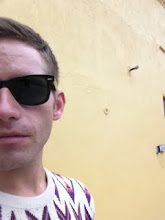 I had time to write another review!
I had time to write another review!Even a seasoned Woody Allen fan might mistake the auteur’s latest film, Vicky Christina Barcelona, for the work of another filmmaker. That is, until the characters open their mouths.
Allen’s latest sparkles with sumptuous, sure-footed visuals as few of his previous films have. While nothing can be compared to Manhattan’s arresting black and white cinematography, this is his most compelling work in color. He captures Barcelona in all its sun-soaked glory. But when his characters begin talking, and falling in and out of love, it’s unmistakably an Allen film.
The film follows two Americans, the engaged, sensible Vicky (The Prestige’s Rebecca Hall) and the impulsive, unmoored Christina (Match Point’s Scarlett Johansson), as they spend a summer vacationing in Barcelona. Their reasons for traveling are dubious at best (Vicky is getting her doctorate in Catalan studies, but inexplicably speaks not a word of Spanish), but that’s not the point. It becomes achingly clear that they are in Spain to fall in love, whether they like it or not.
Seduction comes in the form of the painter Juan Antonio (No Country for Old Men’s Javier Bardem). The girls don’t get through their first day in Spain before being whisked off to a rural village with Juan Antonio, where he attempts to seduce them both. As he pursues both women, and they pursue him to a sometimes surprising effect, Allen explores the various maddening effects of attraction.
Madness and love become inseparable when Maria Elena (Volver’s Penelope Cruz), Juan Antonio’s ex-wife, joins the film. Cruz blasts in and out of scenes with a primal voracity, brimming with unstable passion and jolting the sleepy film into something that demands attention. Every time she leaves a scene I wanted to follow.
Cruz turns out to be the film’s most apt performer. Johansson has never looked so uncomfortable on screen, and it’s impossible to know why Allen keeps on casting her in his films. She’s awkward and clumsy, and can’t seem to convey any of Christina’s restlessness or terminal dissatisfaction. Conveying emotion can be difficult, I suppose, when one’s lips and bust line are doing the heavy lifting.
Hall fairs better. Vicky is the type of role Diane Keaton would have played for Allen in the ’70s, a sophisticated, sometimes brash know-it-all who projects superiority to mask crippling insecurity. Hall has great comic timing and imbues the character with relatable false confidence and vulnerability.
Bardem’s role plays up his screen idol appeal, and completely wipes away of his creepy psycho-killer from No Country for Old Men.
While Allen has fun exploiting some of the romantic entanglements, the film ultimately becomes too convoluted to be worth the trouble. Allen gets this, too, as the many bizarre revelations and outlandish plot elements in the third act scream desperation.
Allen’s latest sparkles with sumptuous, sure-footed visuals as few of his previous films have. While nothing can be compared to Manhattan’s arresting black and white cinematography, this is his most compelling work in color. He captures Barcelona in all its sun-soaked glory. But when his characters begin talking, and falling in and out of love, it’s unmistakably an Allen film.
The film follows two Americans, the engaged, sensible Vicky (The Prestige’s Rebecca Hall) and the impulsive, unmoored Christina (Match Point’s Scarlett Johansson), as they spend a summer vacationing in Barcelona. Their reasons for traveling are dubious at best (Vicky is getting her doctorate in Catalan studies, but inexplicably speaks not a word of Spanish), but that’s not the point. It becomes achingly clear that they are in Spain to fall in love, whether they like it or not.
Seduction comes in the form of the painter Juan Antonio (No Country for Old Men’s Javier Bardem). The girls don’t get through their first day in Spain before being whisked off to a rural village with Juan Antonio, where he attempts to seduce them both. As he pursues both women, and they pursue him to a sometimes surprising effect, Allen explores the various maddening effects of attraction.
Madness and love become inseparable when Maria Elena (Volver’s Penelope Cruz), Juan Antonio’s ex-wife, joins the film. Cruz blasts in and out of scenes with a primal voracity, brimming with unstable passion and jolting the sleepy film into something that demands attention. Every time she leaves a scene I wanted to follow.
Cruz turns out to be the film’s most apt performer. Johansson has never looked so uncomfortable on screen, and it’s impossible to know why Allen keeps on casting her in his films. She’s awkward and clumsy, and can’t seem to convey any of Christina’s restlessness or terminal dissatisfaction. Conveying emotion can be difficult, I suppose, when one’s lips and bust line are doing the heavy lifting.
Hall fairs better. Vicky is the type of role Diane Keaton would have played for Allen in the ’70s, a sophisticated, sometimes brash know-it-all who projects superiority to mask crippling insecurity. Hall has great comic timing and imbues the character with relatable false confidence and vulnerability.
Bardem’s role plays up his screen idol appeal, and completely wipes away of his creepy psycho-killer from No Country for Old Men.
While Allen has fun exploiting some of the romantic entanglements, the film ultimately becomes too convoluted to be worth the trouble. Allen gets this, too, as the many bizarre revelations and outlandish plot elements in the third act scream desperation.


No comments:
Post a Comment